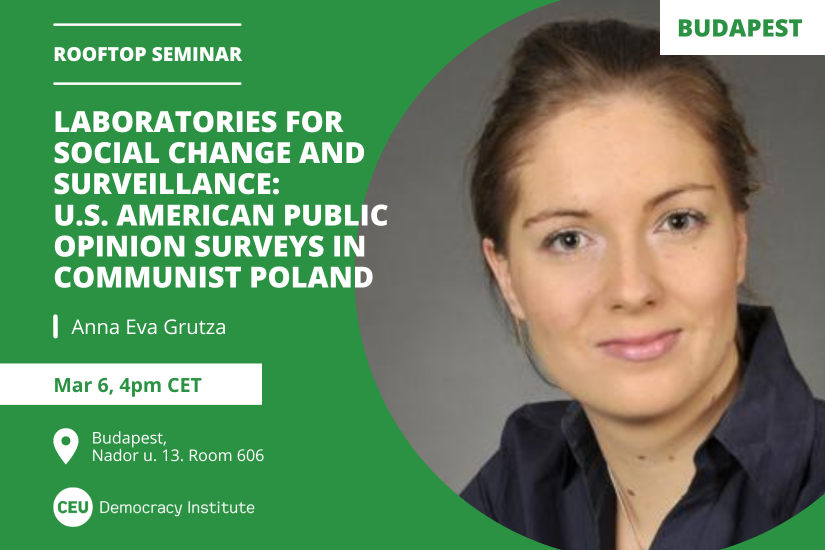
The De- and Re-Democratization Workgroup of the CEU Democracy Institute cordially invites you to its next Rooftop Seminar.
If you would like to attend, please register here.
Please keep in mind that external guests will not be able to enter the building without prior registration.
Public opinion under communism is a paradox. It has generally been regarded as suppressed, if not inexistent because of the striking lack of a public sphere of civil society. At the same time, the sudden rebirth of sociology and, with it, the rise in public opinion research in Cold War Poland has been celebrated as an important breakthrough for the evolution of the discipline. It was a crucial stimulus for political relaxation also manifested through intense exchanges with US-American institutions and scholars like Paul Lazarsfeld. However, this unexpected freedom of Polish sociologists and social psychologists raises questions regarding the interests of state actors and patronage-systems operating behind the scenes in Poland and the US.
This paper re-centers the analysis to the dynamic of mutual monitoring, imitation and surveillance practices between the antagonistic systems. The social laboratory emerges thereby as a crucial place equally suited for surveillance and the study and implementation of social change. Furthermore, the author makes the claim that Polish opinion research also inherited from the West the idea of propaganda and surveillance as linked to it from the outset blurring the line between authoritarian and democratic systems. The paper argues for the necessity to place these transnational scientific exchanges in the context of the genesis of mass communication, propaganda, and public opinion research in the United States. It looks at the transsystemic spread of this Cold War knowledge regime characterized by (neo-)positivistic premises for the calculation and prediction of human action and attitudes including its strategies to cope with the unknown, unpredictable, and uncertain. In so doing, it analyses the equal use of opinion research by the state, the surveillance apparatus, the Polish political opposition, and social scientists.
The paper is available at request from the author.
Speaker:
Anna Eva Grutza is an OSUN Doctoral Fellow at the CEU Democracy Institute, and a PhD Candidate in Comparative History at CEU. In her dissertation she focuses on Cold War truth regimes, questions of epistemology, subjectivity and objectivity in relation to the work of Radio Free Europe. She investigates how Cold War information analysis dealt with error, ignorance and unreliability by tracing the term ‘paranoia’ as an epistemic criterion, its ways of shaping possibilities of knowledge, and its feedback processes upon scientific and political discourses. She works on the intersection between the history of Cold War social sciences and that of everyday life. She regards the problematic of ‘paranoia’ as being indicative of a particular Cold War irrationality.
Discussant:
Matthias Duller is a historical sociologist and a recipient of an APART-GSK Fellowship of the Austrian Academy of Sciences in the Department of History at Central European University. His research has focused on the institutional and political history of the social sciences in Cold War Europe, comparing developments East and West of the Iron Curtain. His current habilitation project studies the effects of American fellowship programs for social scientists from Communist Eastern Europe from the 1950s to the 1980s.
Chair:
Zsolt Enyedi is a Senior Research Fellow at the CEU Democracy Institute, and Professor at the CEU Department of Political Science. He studied comparative social sciences, history, sociology and political science in Budapest and Amsterdam. The focus of his research interests is on party politics, comparative government, church and state relations, and political psychology (especially authoritarianism, prejudices and political tolerance). His articles appeared in journals such as Political Psychology, European Journal of Political Research, Political Studies, West European Politics, Party Politics, Political Studies, Europe-Asia Studies, Problems of Post-Communism, Journal of Ideologies or European Review. He was the 2003 recipient of the Rudolf Wildenmann Prize and the 2004 winner of the Bibo Award. His most recent book, Party System Closure, co-authored with Fernando Casal Bertoa, was published by Oxford University Press in 2021.